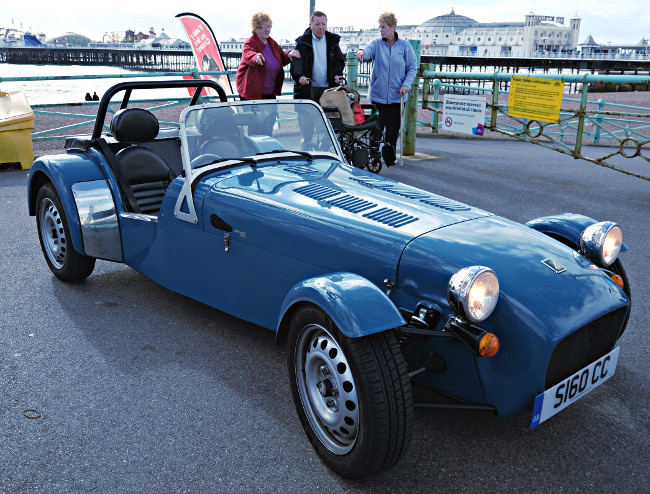This article is more than 1 year old
Caterham Seven 160 review: The Raspberry Pi of motoring
Back to driving's basics with a joyously legal high
Want your new toy painted? That'll be £300 extra, please
The thrills per pound are unbeatable. When I asked passengers – and I had a lot of those in the four days over which I borrowed the car – what they thought it cost, the usual answer was “about £30,000”. I enjoyed telling them it was about £18,000 but that turns out to be a bit like saying a Raspberry Pi costs £25.

Not so reasonably priced: It's a Ryanair-style approach to basics from Caterham - including the exterior paint job
Just as you need a display and keyboard for a Pi, Caterham employs a somewhat Ryanair-style model for “optional” extras. The only “extra” the review car didn’t have was a 12v socket. The heater costs £300; paint is £150; and there is an “on the road” pack, which feels a bit like it should be included as that includes the IVA inspection, road tax and delivery. That will set you back another £580.
Then there is the windscreen, hood and doors – which include the mirrors. That’s another £1,250. So the car you see here is over £21,000, which wouldn’t feel expensive if that was the sticker price but when Caterham says “kits from £14,995”, it comes as a bit of a shock to find that it’s actually 25 per cent more than that. For the same money you could get half an Audi TTS or all of a Fiesta ST.
I’d expected the 160 to be an itch-scratching event. Something that was great for a while but not a car to live with. Yet after four days and 300 miles I feel that this is something I’d really want in my life; a way to blow away the cobwebs. I don’t understand why someone would buy a £50,000 BMW when they could have a £30,000 BMW and one of these. Get a 520D instead of an M5. All the extra fun that money buys is an order of magnitude greater in a Seven.
I have a theory about the Raspberry Pi. It’s success isn’t really as an educational computer for schoolkids but for greying old men like me who tinkered with BBC Micros and Ohio Superboards, who, thirty years on, want to hark back to their teens. So it is with the Caterham Seven. As much as it might fit the profile of something you’d roll up to university in, it’s really for the powerfully-built company director who has made good, and as such makes a perfect partner to a Jaguar Sportbrake. ®
Bootnote
As I dropped the Caterham 160 back the news came through that Caterham F1 had filed for bankruptcy. The car company is, now, nothing to do with the racing team. The history is that the Caterham Seven design was originally the Lotus Seven but the design was sold by Colin Chapman to Graham Nearn in 1972. In April 2011 the company was bought by Tony Fernandes.
In 2010 Fernandes had bought the F1 racing team Team Lotus, which decades previously had been separated from Lotus Cars. With typical F1 shenanigans, Lotus Cars also became involved in Formula 1 with the Renault F1 team, which was renamed Lotus F1. So there were two Lotus teams in Formula One.
Perhaps because of this, Fernandes bought Caterham Cars and renamed his team Caterham F1 with the team working alongside Team Lotus, which led to the odd spectacle of one of the smallest car manufacturers in the world competing in F1.
The team did badly - very badly - and, as always, fingers can be pointed in all directions. After lots of intrigue over the team's future, Fernandes took to Twitter to say he’d had enough and he sold the team. The car company and the racing company were separated and, at the time when I returned the 160, the F1 team was seen as something Tony used to own.
It has, however, since transpired that the sale of the F1 team had a number of preconditions. As the conditions have reportedly not been met, it seems that Fernandes does still own the team. But, at the time of writing, it’s no longer allied to the car company.
Photographs (where not noted otherwise) by Gordon Laing of Cameralabs.com

